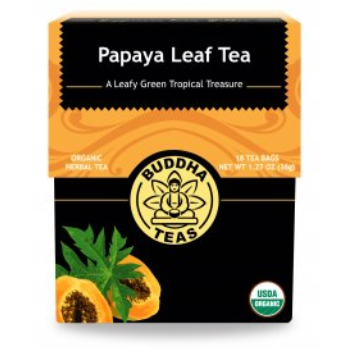Description
Buddha Teas Papaya Leaf Tea has an earthy nutty, not sweet flavor. Popularly known for its fruit, the papaya plant’s leaves are also useful, especially to create a tummy-soothing herbal tea.
Papaya Leaf Tea Health Benefits
- Source of magnesium & phosphorus
- Phytochemical-rich
- Contains vitamins C, & E
- 18 Bleach Free Tea Bags / Box
Brewing Suggestions
For a proper cup of tea …
- Recommended temperature: 205°
- Cover and steep to taste.
- Remove tea bag and enjoy!
In the Know
Though you probably know that the orangish-yellow fruit part of the papaya tree is a common breakfast food in the tropics and elsewhere, the papaya leaf at the top of the tree is used as well, often steamed and plated up as a side dish. With this in mind, realize that even though the papaya fruit is jam packed with beneficial enzymes and phytochemicals, the leaves of the papaya tree also boast nutrients worth taking a second look at.
Let’s Explore the Papaya Tree
A tall tree with leaves only at the top, the papaya tree is actually not a tree at all! It is technically called a herbaceous plant because its “stem” (rather than a trunk) is not wood, and remains green and soft for its entire lifespan.
You already know that the papaya fruit grows on trees that hail from the tropics, originally southern Mexico to Central America. Today you will find commercial papaya trees in most tropical regions across the globe. Papaya trees need a warm climate, and soil that is well-drained. A tree cannot exist in freezing temperatures, and even temps as high as 59 degrees F won’t allow a papaya tree to thrive. The best air temperature to produce healthy fruit is 70 to 90 degrees F.
How to Brew Papaya Leaf Tea
We recommend pouring boiling water over your tea bag and covering, but suggest steeping for no longer a few minutes to ensure optimum flavor; best to experiment to find out your personal taste preference.
What Does Buddha Teas Papaya Leaf Tea Taste Like?
If you’re expecting your cup of Buddha Teas Papaya Leaf Tea to taste like a sweet, sunny day in the tropics, you’ll be setting yourself up for disappointment. The fruit of the papaya tree is not the leaf of the tree, so expect a rather earthy, somewhat nutty flavor. It’s brownish-gold tint reveals that it’s its own thing; in other words, the papaya leaf refuses to act like a papaya fruit on the set of a Hawaiian beach photo shoot. Steep carefully, as too long a dunk and the tea will turn bitter. For optimal taste pleasure, we recommend that you enjoy your Buddha Teas Papaya Leaf Tea with a touch of the sweetener you like best.
Why choose Buddha Teas?
What sets us apart from other tea companies? We start with a philosophy of living in harmony with nature, not using it for profit. Buddha Teas uses only fresh, pure organic or sustainably wild harvested ingredients and maintains their natural purity in every tea we sell. We have also created the “Teas for Trees” campaign, planting 5000 trees a year to offset the paper use in our tea bags. Each of our tea bags is bleach-free to eliminate the risk of chemicals, and our boxes are made from 100% recycled material. When you buy Buddha Teas, you’ll enjoy the fresh, full flavor of a truly natural tea in every sip.


Reviews
There are no reviews yet.